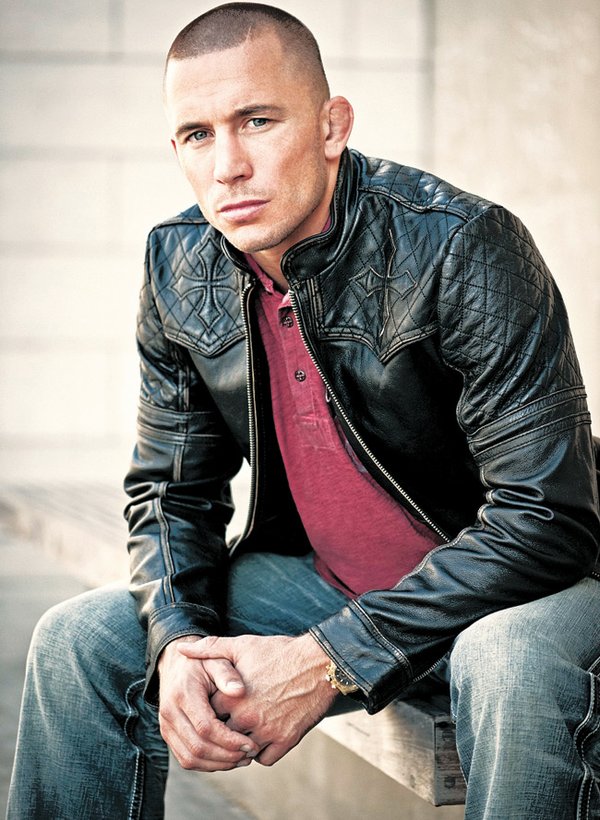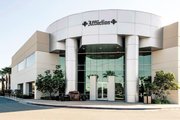FIGHTER’S COAT: Georges St.-Pierre, an MMA fighter sponsored by Affliction, wears an Affliction leather jacket.
Affliction Clothing Expands Internationally
“Live Fast” is the motto of Affliction Clothing, which was highly popular with the mixed-martial-arts crowd. But the company, born in 2005, now sees its future in department stores as well as gyms and boxing arenas both in the United States and internationally.
That’s the strategy as some of the co-founders retake the reins of the company.
Before, a focus on athletics and MMA fighting was responsible for the company’s fast growth. In 2009, revenues reportedly were $100 million after the start-up company set down roots in Seal Beach, Calif., with a 70,000-square-foot headquarters building.
But a few years ago, the clothing company with an edgy feel started to go corporate, which ended up landing the company on the ropes, said Affliction co-founder Clif Chason.
In February 2012, Affliction partnered with an investor group led by Bob Meers, a former Reebok and Lululemon Athletica executive, and New Evolution Ventures, a private-equity firm that specializes in fitness and sports ventures.
Affliction co-founders Chason, Eric Foss and Courtney Dubar disagreed with their corporate partners taking on a larger staff, their bureaucratic decision-making process and larger focus on athletics. “It was starting to affect design, production and the way we do business,” Chason said.
By October, New Evolution Ventures and Meers were history. “Affliction operates better as a pirate ship than the Navy,” Chason observed.
Since then, Affliction has been trying to overcome its reputation as solely a fight T-shirt brand and has been branching out into a lifestyle collection of jeans and woven tops for men and jeans and dresses for women. Wholesale prices range from $19.50 for a basic T-shirt to $297 for a leather jacket.
Its Sinful label is geared toward juniors.
Reaching a wider retail realm is even more important for Affliction these days because many of the boutiques and sports clubs that Affliction sold to were tapped out by the Great Recession of 2009. However, Affliction continues to have a strong business relationship with national specialty chain The Buckle Inc.
The Nebraska-based chain now accounts for more than 10 percent of Affliction’s sales, according to Chason, who declined to reveal the company’s current revenues.
With growth in mind, Affliction hired a new president of sales, E.T. Southard. He joined the company to further develop the line’s business with majors.
A new director of sourcing, Nabad Reynoso, was brought on to improve the company’s factories as higher-quality fashion and better fits will be needed for a wider lifestyle collection. Foss, who runs the design team, has a few new designers.
MMA clothing’s popularity skyrocketed in 2007 when the category seemed to burst onto the clothing scene. Selling MMA clothing to enthusiasts still remains competitive.
MMA has a reputation for being a tough sport, but its fans have remained loyal to it, which has helped the business grow. Frank Trigg, a former MMA apparel manufacturer and now sports commentator who still follows the business, said MMA apparel customers demand that brands maintain a genuine connection with the sport and are fashion savvy.
“The sport grew and got smart. We got more fashion-oriented about what we were doing,” said Trigg, whose Los Angeles clothing line, Triggonomix, closed in 2010. “We’re not Michael Kors. It’s not Ralph Lauren yet, but it is starting to go there.”
Along with increasing its presence at major retailers, Affliction intends to further develop its overseas business. The company’s foreign partners, who are wholesale distributors with the option to open stores, currently run 11 boutiques, including four stores in Moscow, two shops in South Africa and one in Japan.
In June, Affliction distributors are scheduled to open two boutiques—one in Dubai and another in Seoul, South Korea—with more shops on the way in Bangkok and Ho Chi Minh City, Vietnam.
In the next five years, Chason forecasts, foreign business will make up more than 25 percent of Affliction’s revenues.
While the company is venturing out into the global retail world, the brand has put its own U.S. retail expansion plans on the back burner. It continues to run flagship boutiques in Las Vegas; Miami; and Paramus, N.J., as well as a flagship store it opened in 2011 at its Seal Beach compound.
But it did not renew its lease last year for a boutique on Melrose Avenue in Los Angeles. And it did not execute a 2011 plan to roll out five flagship boutiques across the United States because of the struggling economy.
But the company doesn’t want to move away from the company’s roots and the customers who have supported it all these years. “We want to be involved in very edgy lifestyles—fighting, motorcycles and metal music. Those audiences support our brand,” Chason said.
But for growth it has to move beyond the MMA world for a knockout.























